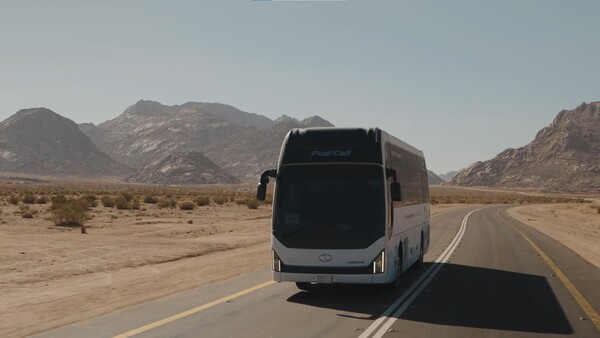Successful driving test in 2,000-meter mountain terrain highlights Hyundai’s leadership in future mobility and NEOM’s Vision 2030

Hyundai Motor Group has successfully completed a hydrogen mobility driving test in Saudi Arabia’s futuristic smart city project, NEOM, solidifying its leadership in next-generation transportation technologies.
The company announced on August 4 that it had conducted a field test with its high-speed hydrogen fuel cell electric bus, Universe FCEV, from May 17 to 27 in the Trojena region of NEOM. Known for its extreme terrain, Trojena features both mountainous and desert landscapes, with altitudes exceeding 2,000 meters—conditions that pose a significant challenge for large commercial vehicles like hydrogen-powered buses.
Unlike standard passenger cars, the Universe FCEV has a higher center of gravity and longer braking distance, which makes driving on such demanding routes technically complex. Despite these obstacles, the test was completed successfully, proving the vehicle’s performance and reliability under extreme conditions.
A key component of this test was the implementation of Altitude Compensation Map technology. This system optimizes the fuel cell’s oxygen intake in high-altitude areas where oxygen levels are low, ensuring consistent power output and driving stability. Real-time environmental monitoring and adaptive controls helped the vehicle maintain optimal performance throughout the journey.
NEOM is central to Saudi Arabia’s Vision 2030—an ambitious initiative aimed at reducing reliance on fossil fuels and promoting a sustainable, tech-driven economy. Hyundai Motor Group’s active involvement in NEOM showcases its commitment to zero-emission solutions and long-term cooperation in global sustainability goals.
A Hyundai official stated, “Hyundai Motor Group is the first in the world to successfully operate hydrogen mobility in NEOM’s mountainous terrain. This achievement is not just a demonstration of our technical prowess, but a meaningful step toward establishing a global hydrogen ecosystem.”
He added, “As a strategic partner in realizing Saudi Arabia’s Vision 2030, we will continue to accelerate innovation in eco-friendly mobility and contribute to the construction of sustainable transport systems worldwide.”
Following the trial, Hyundai plans to leverage the data collected to enhance its hydrogen bus technology, ensuring stable performance in hot, high-altitude, and desert environments. The company aims to expand its role as a global leader in clean public transportation systems through continued innovation.

